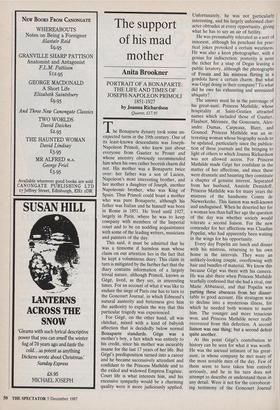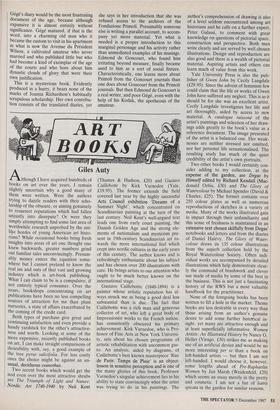The support of his mad mother
Anita Brookner
PORTRAIT OF A BONAPARTE: THE LIFE AND TIMES OF JOSEPH-NAPOLEON PRIMOLI 1851-1927 by Joanna Richardson
Quartet, f17.95
The Bonaparte dynasty took some un- expected turns in the 19th century. One of its least-known descendants was Joseph- Napoleon Primoli, who knew just about everyone from Gautier to Proust and whose ancestry obviously recommended him when his own rather boorish charm did not. His mother was a Bonaparte twice over: her father was a son of Lucien, Napoleon's most interesting, brother, and her mother a daughter of Joseph, another Napoleonic brother, who was King of Spain. Thus Primoli could boast a mother who was pure Bonaparte, although his father was Italian and he himself was born in Rome in 1851. He lived until 1927, largely in Paris, where he was to keep company with members of the Imperial court and to be on nodding acquaintance with some of the leading writers, musicians and painters of the day.
This said, it must be admitted that he was a tiresome if harmless man whose claim on our attention lies in the fact that he kept a voluminous diary. This claim in turn is mitigated by the further fact that the diary contains information of a largely trivial nature, although Primoli, known as Gege, lived, as they say, in interesting times. For an account of what it was like to endure the siege of Paris one has to turn to the Goncourt Journal, in which Edmond's natural austerity and bitterness give him the authority to explain the way that this particular tragedy was experienced.
For Gdge, on the other hand, all was chitchat, mixed with a kind of babyish affection that is decidedly below normal Bonaparte standards. Gege was a mother's boy, a fact which was entirely to his credit, since his mother was incurably insane for the last 17 years of her life. But Geg6's predisposition turned into a career and he became successively attendant and confidant to the Princess Mathilde and to the exiled and widowed Empress Eugenie. Court life is what interests him, and his excessive sympathy would be a charming quality were it more judiciously applied. Unfortunately, he was not particularly interesting, and his largely unformed char- acter obtrudes at every opportunity, giving what he has to say an air of futility. He was presumably tolerated as a sort of innocent, although his penchant for prac- tical jokes provoked a certain weariness. He was also a keen photographer, with a genius for indiscretion: posterity is none the richer for a snap of Degas leaving a public lavatory, although the photographs of Forain and his mistress flirting in a gondola have a certain charm. But what was Gege doing in their company? To what did he owe his exhausting and unresisted ubiquity? The answer must lie in the patronage of his great-aunt, Princess Mathilde, whose hospitality at Saint-Gratien attracted names which included those of Gautier, Flaubert, Merimee, the Goncourts, Alex- andre Dumas, Carpeaux, Bizet, and Gounod. Princess Mathilde was an in- teresting woman whose biography needs to be updated, particularly since the publica- tion of these journals and the bringing to light of others to which Joanna Richardson was not allowed access. For Princess Mathilde made Gege her confidant in the matter of her affections, and since these were dramatic and haunting they constitute a chapter of genuine interest. Separated from her husband, Anatole Demidoff, Princess Mathilde was for many years the mistress of the handsome Comte de Niewerkerke. This liaison was well-known and undisguised. When he deserted her for a woman less than half her age the question of the day was whether society would tolerate a .second liaison. For the new contender for her affections was Claudius Popelin, who had apparently been waiting in the wings for his opportunity.
Every day Popelin ate lunch and dinner with his mistress, returning to his own home in the intervals. They were an unlikely-looking couple, overflowing with hair and bundles of material. We know this because Gege was there with his camera. • He was also there when Princess Mathilde tearfully confessed that she had a rival, one Marie Abbatucci, and that Popelin was putting these absences from her dinner- table to good account. His stratagem was to decline into a mysterious illness, for which he needed both women to nurse him. The younger and more tenacious won, and Princess Mathilde never really recovered from this defection. A second liaison was one thing; but a second defeat quite another.
At this point Gees contribution to history can be seen for what it was worth. He was the asexual intimate of his great- aunt, in whose company he met many of the most notable men of the day. Few of them seem to have taken him entirely seriously, and he in his turn does not attempt to describe or understand them in any detail. Were it not for the corroborat- ing testimony of the Goncourt Journal Gege's diary would be the most frustrating document of the age, because although expansive it is almost entirely without significance. Gege matured, if that is the word, into a charming old man who it became the custom to visit in his apartment in what is now the Avenue du President Wilson, a cultivated amateur who never married and who published little but who had become a kind of exemplar of the age of the courts and who bore about him dynastic clouds of glory that were their own justification.
This is a mysterious book. Evidently produced in a hurry, it bears none of the marks of Joanna Richardson's habitually scrupulous scholarship. Her own contribu- tion consists of the translated diaries, yet she says in her introduction that she was refused access to the archives of the Fondazione Primoli. Presumably someone else is writing a parallel account, to accom- pany yet more material. Yet what is needed is a proper introduction to this marginal personage and his activity rather than unmediated examples of his musings. Edmond de Goncourt, who found him irritating beyond measure, finally became used to him as a sort of social fixture. Characteristically, one learns more about Primoli from the Goncourt journals than one does about Goncourt from the Primoli journals. But then Edmond de Goncourt is a real writer, and poor Gege, even with the help of his Kodak, the apotheosis of the amateur.











































































 Previous page
Previous page